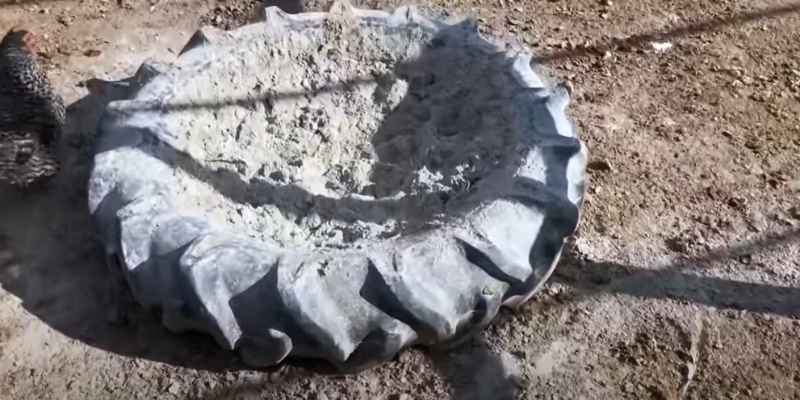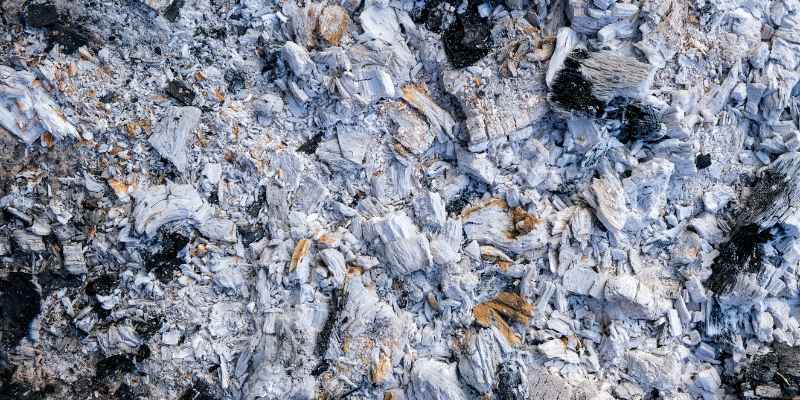The best wood ash for chickens is from hardwood such as maple, oak, cherry, or birch due to its anti-parasitic and anti-bacterial properties, providing essential vitamins and deterring pests. Wood ash and charcoal can be added to the chicken coop bedding and dust bath to benefit the chickens’ health and hygiene.
Additionally, during the winter, wood ash can help reduce the risk of lice or mites in the coop. It’s important to ensure that the wood ash is clean and finely sifted to avoid any potential harm to the chickens. Quality wood ash can be sourced from reputable suppliers or retailers to provide a safe and beneficial environment for the chickens.
Introduction To Wood Ash Benefits For Chickens
Enhance your chicken’s health with wood ash, offering anti-parasitic and anti-bacterial properties, along with essential nutrients like vitamin K, calcium, and magnesium. A dust bath with wood ash aids in deterring pests and absorbing toxins from the feathers, keeping your chickens happy and healthy year-round.
As a backyard chicken owner, you want to ensure that your feathered friends are healthy and happy. One way to do this is to provide them with wood ash, which has many benefits for chickens. In this article, we will explore the reasons why you should use wood ash in your chicken coop, including the health benefits it provides for your chickens.
Why Use Wood Ash?
Wood ash is a byproduct of burning wood and is a great addition to your chicken coop. Here are some reasons why you should use wood ash for your chickens:
- Anti-parasitic and anti-bacterial properties: Wood ash has been shown to have anti-parasitic and anti-bacterial properties, which can help keep your chickens healthy.
- Vitamin K: Wood ash contains vitamin K, which is essential for blood clotting and bone health in chickens.
- Calcium and magnesium: Wood ash is a good source of calcium and magnesium, which are important for strong bones and eggshell production.
- Charcoal: Charcoal in the ash helps to absorb toxins on their feathers, keeping your chickens clean and healthy.
Health Benefits For Chickens
In addition to the benefits listed above, wood ash has many health benefits for your chickens:
- Prevention of lice and mites: Wood ash can help prevent lice and mites from infesting your chicken coop, which can be a common problem for backyard chicken owners.
- Improvement of respiratory health: Wood ash can help improve the respiratory health of your chickens by reducing moisture in the coop, which can lead to respiratory issues.
- Promotion of healthy digestion: Wood ash can help promote healthy digestion in your chickens by providing them with essential minerals and nutrients.
In conclusion, wood ash is a great addition to your chicken coop and provides many health benefits for your chickens. By using wood ash, you can help keep your chickens healthy and happy, and prevent common problems that can arise in backyard chicken keeping.

Types Of Wood Ash Suitable For Chickens
When it comes to choosing the best wood ash for your chickens, it’s important to consider the type of wood used and the quality of the ash. Different types of wood ash can offer various benefits to your flock, so let’s explore the key factors to keep in mind.
Hardwood Vs. Softwood Ash
Hardwood ash is preferred for chickens due to its higher mineral content and slower burn rate compared to softwood ash. Oak, maple, and cherry are excellent choices for hardwood ash. On the other hand, softwood ash from pine or spruce may contain higher levels of resin, which can be harmful to chickens.
Identifying Quality Wood Ash
Quality wood ash should be light grey in color, fine in texture, and free from any additives or contaminants. Avoid ash from treated or painted wood, as it can be toxic to chickens. Always opt for organic, unsifted hardwood ash for the best results.
Preparing Wood Ash For Use
Preparing wood ash for use in the chicken coop is essential for the health and well-being of your chickens. Wood ash has anti-parasitic and anti-bacterial properties, and it provides essential vitamins and minerals like vitamin K, calcium, and magnesium. Adding a handful of wood ash to the chicken’s dust bath can help deter pests and keep your chickens happy and healthy.
Wood ash is a great addition to your chicken coop as it provides various benefits such as anti-parasitic and anti-bacterial properties, along with essential vitamins and minerals like vitamin K, calcium, and magnesium. However, before using wood ash, it is important to prepare it properly. In this section, we will discuss how to sift and store wood ash, along with some safety precautions to keep in mind.
Sifting and Storage
When using wood ash in your chicken coop, it is important to sift it properly to remove any large debris or chunks of wood. You can use a fine mesh sieve or a sifter to sift the wood ash. Once sifted, store the wood ash in a dry, covered container to prevent it from getting wet or exposed to moisture. A plastic container with a tight-fitting lid works well for storing wood ash.
Safety Precautions
While wood ash is generally safe for chickens, it is important to take some safety precautions when using it in your coop. Firstly, avoid using ash from treated or painted wood as it may contain harmful chemicals. Secondly, always wear gloves and a mask when handling wood ash to protect yourself from any potential irritants. Lastly, do not use too much wood ash in your coop as it can cause respiratory issues for your chickens. A handful of wood ash in the dust bath is sufficient.
In conclusion, preparing wood ash for use in your chicken coop is a simple process that involves sifting and proper storage. However, it is important to take some safety precautions to protect yourself and your chickens from any potential harm. By using wood ash correctly, you can provide your chickens with a healthy and natural environment that promotes their overall well-being.
Incorporating Wood Ash Into Chicken Coops
When it comes to incorporating wood ash into chicken coops, there are several benefits that can positively impact the health and well-being of your feathered friends. Wood ash is known for its anti-parasitic and anti-bacterial properties, making it a valuable addition to chicken coop bedding. Additionally, it provides essential nutrients such as vitamin K, calcium, and magnesium, which are beneficial for the overall health of chickens.
Best Practices
When incorporating wood ash into chicken coops, it is important to follow best practices to ensure the safety and well-being of the chickens. One of the best practices is to use wood ash and charcoal, as they have natural properties that can benefit the chickens. Additionally, providing a dust bath with wood ash can help the chickens maintain healthy feathers and deter pests.
Dos And Don’ts
- Do: Provide a designated area for the chickens to take dust baths with wood ash
- Do: Use wood ash from clean, untreated wood sources
- Do: Monitor the chickens’ exposure to wood ash to prevent overconsumption
- Don’t: Use ash from chemically treated or painted wood
- Don’t: Allow the chickens to ingest large amounts of wood ash
- Don’t: Overuse wood ash in the coop, as excessive dust can be detrimental to the chickens’ respiratory health
Wood Ash Dust Baths: A Comprehensive Guide
Discover the best wood ash for chickens and how it can benefit your flock’s health. Find out which types of wood ash and charcoal are ideal for creating effective dust baths that help control parasites and provide essential nutrients for your chickens.
Creating The Perfect Dust Bath
A dust bath is an essential part of a chicken’s hygiene routine. It helps to keep their feathers clean, prevent parasites, and maintain overall health. Creating the perfect dust bath for your chickens is easy and requires just a few simple steps:
- Choose the right location: Find a dry and well-drained area in your chicken coop or run. Ideally, it should be a shady spot to prevent the bath from becoming too hot in the sun.
- Prepare the area: Clear any debris, rocks, or plants from the chosen spot. Level the ground and ensure it is free from moisture.
- Add fine soil: Fill the dust bath area with fine soil or sand. This provides the base for the bath and allows the chickens to dig and roll in it comfortably.
- Introduce wood ash: Sprinkle a generous amount of wood ash over the soil. Wood ash has anti-parasitic and antibacterial properties, and it also provides essential nutrients like vitamin K, calcium, and magnesium for your chickens.
- Mix and maintain: Mix the soil and wood ash thoroughly to ensure an even distribution. Regularly check and replenish the dust bath as needed to maintain cleanliness.
Frequency And Maintenance
Maintaining a clean and functional dust bath is crucial for the well-being of your chickens. Here are some guidelines to follow:
- Frequent use: Chickens love dust baths and will use them regularly. It is recommended to provide them with access to a dust bath at all times.
- Regular cleaning: Periodically clean the dust bath by removing any droppings, feathers, or debris. This helps to prevent the build-up of bacteria and keeps the bath fresh.
- Replenish wood ash: As the chickens use the dust bath, the wood ash will gradually get mixed with the soil. Regularly add more wood ash to maintain its beneficial properties.
- Monitor moisture: Ensure the dust bath remains dry. If it becomes damp or muddy, replace the soil and wood ash mixture to keep it suitable for your chickens’ needs.
By following these guidelines, you can create and maintain a perfect dust bath for your chickens. This will not only contribute to their physical well-being but also keep them happy and content.

Seasonal Considerations For Wood Ash Use
When it comes to using wood ash for chickens, it’s important to consider the seasonal variations and how they can impact the well-being of your flock. Different seasons require different care and adjustments to ensure that your chickens remain healthy and happy. Let’s delve into the seasonal considerations for wood ash use, focusing on winter care and summer adjustments.
Winter Care
In winter, chickens spend more time indoors, which can lead to an increased risk of parasites such as lice and mites. Wood ash can be particularly beneficial during this time as it has anti-parasitic and anti-bacterial properties. Adding wood ash to the coop bedding in winter can help deter pests and promote a healthier environment for your chickens.
Summer Adjustments
During the summer months, chickens may spend more time outdoors, dust bathing and foraging. This is a good time to adjust the amount of wood ash available for dust bathing. Providing wood ash in the dust bath area can help to absorb toxins on their feathers and further deter pests. It also provides essential nutrients such as vitamin K, calcium, and magnesium for your chickens.
Monitoring Chicken Health With Wood Ash Use
Wood ash and charcoal are great for monitoring chicken health as they have anti-parasitic and anti-bacterial properties. Adding a handful of wood ash to the dust bath can provide vitamins and deter pests, while the charcoal helps to absorb toxins on their feathers.
Choose unsifted, hardwood ash for the best results.
Signs Of Positive Impact
Potential Risks And Remedies
Beyond The Coop: Other Uses Of Wood Ash
Beyond the Coop: Other Uses of Wood Ash
Gardening With Wood Ash
Wood ash can be a valuable addition to your gardening routine. It contains essential nutrients like potassium, calcium, and magnesium that can benefit your plants. Wood ash helps raise the pH level of acidic soils, making it ideal for plants that prefer alkaline conditions.
Composting And Soil Enhancement
When added to compost piles, wood ash helps speed up decomposition by balancing carbon and nitrogen levels. It also acts as a natural pest repellent, deterring slugs and snails. Wood ash enriches the soil with nutrients, promoting healthier plant growth.
Frequently Asked Questions
What Kind Of Ash Is Good For Chickens?
Wood ash and charcoal are good for chickens as they have anti-parasitic and anti-bacterial properties. They also provide vitamins and minerals like vitamin K, calcium, and magnesium.
Can I Put Wood Ash In A Chicken Coop?
Yes, wood ash can be put in a chicken coop. It has anti-parasitic and anti-bacterial properties, and can provide some vitamins and minerals like vitamin K, calcium, and magnesium to the chickens. Additionally, wood ash can help deter pests and absorb toxins on their feathers.
However, it should be used in moderation and not be the only material used in the coop bedding.
What Kind Of Wood Ash For Chicken Dust Bath?
Use wood ash or fireplace ash for chicken dust baths as they provide vitamins and deter pests.
Is Wood Ash Good For Chickens In The Winter?
Wood ash is good for chickens in the winter. It has anti-parasitic and anti-bacterial properties, provides vitamins and minerals like vitamin K, calcium, and magnesium, and helps deter pests. Adding wood ash to the chicken coop or dust bath can help reduce lice and mite issues.
Conclusion
Wood ash is a beneficial addition to a chicken’s environment. It provides anti-parasitic and anti-bacterial properties, as well as essential vitamins and minerals like vitamin K, calcium, and magnesium. Adding wood ash to a dust bath can help deter pests and keep chickens healthy.
With its many advantages, using the best wood ash for chickens is a great choice for poultry owners.


